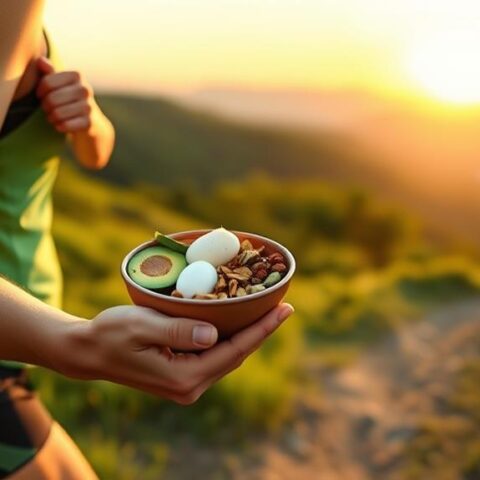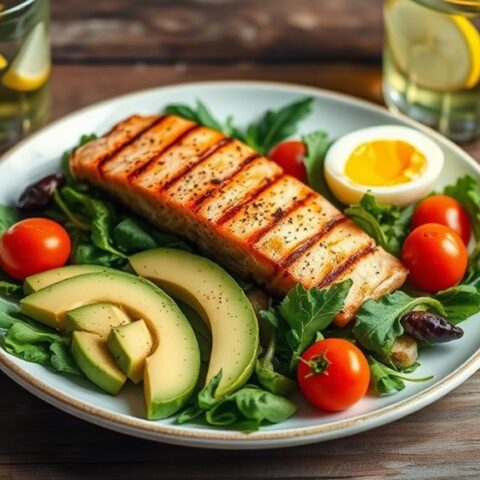
To evaluate if dragon fruit is compatible with a keto diet, scrutinize its carbohydrate content. With 9 grams of net carbs per 100 grams, careful portion control is essential to not exceed the 20-50 gram daily carbohydrate allowance typical in ketogenic plans. Dragon fruit's low fat and protein contribution of 0.14 grams and 0.36 grams per 100 grams, respectively, does not align well with keto's high fat and moderate protein requirements. As a result, incorporating smaller portions or pairing with higher-fat foods is advisable. For insights on optimizing dragon fruit consumption within a keto diet, consider exploring complementary strategies.
Key Takeaways
- Check dragon fruit's net carbs; 9 grams per 100 grams may affect ketosis.
- Limit portion size to manage carb intake within 20-50 grams daily.
- Consider dragon fruit's low fat and protein content, which may not meet keto needs.
- Use dietary tracking tools to monitor carb consumption and maintain ketosis.
- Opt for high-fat, low-carb alternatives like avocados or olives for better keto alignment.
Keto Diet Basics
The ketogenic diet, often referred to as keto, is a structured nutritional approach that emphasizes high fat intake, moderate protein consumption, and a significant reduction in carbohydrates. The primary goal of the ketogenic diet is to induce a metabolic state known as ketosis, where the body shifts from utilizing carbohydrates to burning fats for energy.
During the initial phase, some individuals may experience symptoms known as the keto flu, which typically last about one week as the body adapts. To achieve ketosis, the diet typically restricts daily carb intake to 20-50 grams, necessitating careful calculation of net carbs. This is done by subtracting dietary fiber from the total carbohydrate content, ensuring that carb intake remains within the desired limits.
Adherence to the keto diet requires meticulous attention to the nutritional profile of foods consumed. Healthy fats, such as avocados and olive oil, form the cornerstone of the diet, while portion control is essential to maintaining the balance of macronutrients.
Different variations, such as the Standard Ketogenic Diet (SKD) and the Targeted Ketogenic Diet (TKD), provide specific guidelines on carb intake and timing. Regular monitoring of food intake aids in maintaining the appropriate macronutrient ratios, ensuring the low carb requirements are met.
This structured approach supports weight management and cognitive function improvements.
Dragon Fruit Nutritional Profile
How does dragon fruit fit into a ketogenic diet? The nutritional profile of dragon fruit reveals that, per 100 grams, it contains approximately 12 grams of carbohydrates. This carbohydrate content includes 9 grams of sugar and 3 grams of fiber.
When calculating net carbs per serving, the fiber is subtracted from the total carbohydrates, resulting in about 9 grams of net carbs per 100 grams. Although the fruit is low in carbs relative to other fruits, its net carbs still present a consideration for those strictly adhering to a ketogenic diet, which typically limits daily carbohydrate intake to 20-50 grams.
The ketogenic diet is known for its effectiveness in managing type 2 diabetes by reducing blood glucose levels and improving insulin sensitivity, which might offer additional health benefits when considering dragon fruit's nutritional components.
Dragon fruit is low in calories, providing only 57 kcal per 100 grams, making it potentially useful for weight management. However, its low fat content, at just 0.14 grams per 100 grams, may not align well with the high-fat requirements of a keto diet.
Despite this, dragon fruit is rich in essential vitamins and fiber, offering 4.3 mg of vitamin C and 116 mg of potassium per 100 grams. These nutrients contribute to its status as a healthy choice, though the carbohydrate content must be considered to determine if it can fit into a keto regimen.
Carbohydrate Content Analysis
In evaluating the carbohydrate content of dragon fruit, it is essential to take into account its impact on a ketogenic diet. Dragon fruit, known for its vibrant appearance and nutritional profile, contains approximately 12 grams of carbohydrates per 100 grams, with 3 grams attributed to fiber. This results in a net carb count of 9 grams per 100 grams, a critical consideration for those adhering to a strict keto diet. Given the daily carb limit for ketosis typically ranges from 20 to 50 grams, portion control becomes paramount when incorporating dragon fruit into a keto regimen.
| Component | Amount per 100 grams |
|---|---|
| Total Carbohydrates | 12 grams |
| Sugars | 9 grams |
| Fiber | 3 grams |
| Net Carbs | 9 grams |
| Typical Serving | 200 grams |
The table above highlights the carbohydrate content and its breakdown, emphasizing the importance of calculating net carbs per 100 grams. A regular-sized dragon fruit, weighing about 200 grams, could contribute 24 grams to one's daily carbohydrate intake, consequently potentially exceeding the daily carb limit if not carefully monitored. All varieties of dragon fruit—white, red, and yellow—share similar carbohydrate profiles, reinforcing the need for moderation within a keto framework.
Fitting Dragon Fruit Into Keto
Incorporating dragon fruit into a ketogenic diet requires meticulous management of carbohydrate intake through precise portion control, given its 10.04g of net carbs per 100g serving.
While dragon fruit offers nutritional benefits such as antioxidants and vitamins, its low fat content and relatively high carbohydrate load present limitations within the keto framework.
To effectively integrate dragon fruit without exceeding daily carb limits, regular tracking of carbohydrate intake using apps or food diaries is essential.
Careful integration of small amounts into meals, such as smoothies or salads, can allow for its inclusion without exceeding daily carb limits, emphasizing the importance of thorough meal planning.
Managing Carbs With Portion Control
Effectively managing carbohydrate intake is paramount when incorporating dragon fruit into a ketogenic diet, as it contains approximately 10.04 grams of net carbs per 100 grams. Given the keto diet's strict limitation of 20-30 grams of daily net carb intake, portion control becomes essential.
A standard dragon fruit, weighing around 200 grams, comprises about 24 grams of total carbs, making it unsuitable for consumption in its entirety if ketosis is to be maintained. Instead, a smaller serving size, such as 50 grams, aligns better with keto guidelines, contributing only 5 grams of net carbs per serving.
The process of carb counting is instrumental in managing carbs effectively while enjoying dragon fruit. By meticulously monitoring the nutritional content of the portions consumed, one can guarantee that the daily net carb intake remains within the desired range.
Using dietary tracking tools can further enhance this process by offering precision in carb calculations and assisting in the adherence to the keto diet.
Ultimately, the key lies in understanding and adjusting the serving size to enjoy dragon fruit's unique flavor without jeopardizing the metabolic state of ketosis, thereby optimizing its inclusion in a ketogenic lifestyle.
Nutritional Benefits and Limitations
Dragon fruit's nutritional profile presents both benefits and limitations for individuals adhering to a ketogenic diet. With approximately 12 grams of carbohydrates per 100 grams, its carb content can challenge the daily carbohydrate intake constraints of keto followers. The macronutrient profile indicates 10.04 grams of net carbs per serving, necessitating vigilant portion sizes to align with the recommended net carb limit of 20-30 grams for sustaining ketosis.
While dragon fruit is low in fats, which contrasts with the high-fat requirements of keto, its fiber content of 3.1 grams per serving can partially offset its carbohydrate impact.
The nutritional benefits of dragon fruit include a rich supply of vitamin C and antioxidants, contributing to overall health benefits. However, its compatibility with a ketogenic diet demands careful management. Here are key considerations:
- Mindful Portion Sizes: To integrate dragon fruit into a low-carb foods regimen without exceeding carb limits.
- Fiber Content Utilization: Leveraging fiber to moderate net carbs per serving.
- Balanced Macronutrient Profile: Ensuring overall dietary fat intake remains high.
- Carbohydrate Intake Monitoring: Preventing exceedance of keto carbohydrate thresholds, thereby preserving ketosis.
Strategic consumption is essential for keto adherence while enjoying dragon fruit's benefits.
Evaluating Fat and Protein Levels
In evaluating the suitability of dragon fruit for a keto diet, it is crucial to assess its macronutrient composition, particularly its fat and protein levels.
With only 0.14g of total fats and 0.36g of protein per 100g serving, dragon fruit does not meet the high-fat and moderate-protein requirements typical of ketogenic dietary guidelines.
Consequently, individuals adhering to a keto diet should consider alternative foods with higher fat and protein contents to maintain appropriate macronutrient ratios.
It's important to prioritize healthy fat sources such as avocados and olive oil to guarantee a balanced intake of essential fatty acids.
Assess Fat Content
Evaluating the fat content of dragon fruit reveals a significant disparity between its macronutrient profile and the requirements of a ketogenic diet.
When considering if dragon fruit fits into a keto diet, analyzing its fat content is essential. With only 0.14g of total fats per 100g serving, dragon fruit's low fat composition starkly contrasts with the ideal macronutrient distribution that prioritizes healthy fats for energy in a ketogenic lifestyle.
The keto diet typically necessitates a macronutrient ratio of approximately 70% fat, a target unmet by dragon fruit's profile, consequently affecting its fruit compatibility within this dietary framework.
In addition to its minimal fat content, dragon fruit's protein levels are also insufficient at 0.36g per 100g serving, failing to support the protein requirements vital for a keto diet.
Consider these points:
- Low Fat Content: Fails to meet the high-fat demands essential for ketosis and energy.
- Insufficient Protein: Inadequate to fulfill protein requirements on a keto diet.
- Macronutrient Imbalance: Does not align with the core principles of a ketogenic lifestyle.
- Contrast with Ideal Foods: Lacks the healthy fats found in avocados and nuts.
Analyze Protein Intake
Although often celebrated for its vibrant appearance and nutrient content, dragon fruit falls short when it comes to meeting the protein intake necessary for a ketogenic diet. With only 0.36g of protein per 100g serving, dragon fruit fails to support the recommended protein levels essential for this low-carb dietary approach.
The ketogenic diet typically emphasizes a macronutrient ratio of approximately 70% fat, 20-25% protein, and 5-10% carbohydrates. This makes it essential to prioritize higher-protein foods such as meats, eggs, and dairy over dragon fruit to meet dietary protein needs effectively.
The nutritional profile of dragon fruit, being low in both fat (0.14g per 100g) and protein, limits its utility in contributing to the protein requirements important for muscle maintenance and sustaining energy levels within a keto diet.
Consequently, incorporating dragon fruit should be done judiciously, ensuring it does not displace more nutrient-dense, protein-rich options. Monitoring overall dietary protein intake is critical for maintaining the necessary macronutrient balance that supports ketosis.
Ultimately, while dragon fruit can be part of a varied diet, it does not substantially contribute to the protein goals required for a successful ketogenic lifestyle.
Alternatives to Consider
When evaluating suitable alternatives to dragon fruit for a ketogenic diet, a few low-carb options stand out for their nutritional benefits and ability to maintain ketosis. Dragon fruit contains higher carb counts, which may disrupt ketosis, making it essential to explore other alternatives to examine. A keto diet without exceeding carb limits can still provide essential nutrients using these options.
For instance, avocados are rich in monounsaturated fats that promote heart health and are high in potassium, supporting overall health. They are an excellent source of healthy fats and important nutrients, offering 1.8g net carbs per 100g. Furthermore, they provide a creamy texture to meals while supporting the keto diet without adding excessive carbs.
Olives, with only 0.5g net carbs per 100g, are a low-calorie, nutrient-dense option perfect for those who want to maintain ketosis without compromising on taste. They can be a good source of healthy fats in a low-carb smoothie.
Tomatoes, at 2.3g net carbs per 100g, add flavor and nutrients to various keto-friendly dishes, making them a versatile choice to incorporate into meals.
Berries, such as raspberries and blackberries, with 5.4g and 4.9g net carbs per 100g respectively, are high in fiber and antioxidants, enhancing nutritional value without exceeding carb limits.
Creative Keto Meal Ideas
Dragon fruit can be strategically incorporated into a ketogenic diet by leveraging its unique flavors and nutritional profile in creative meal preparations. When considering Dragon Fruit Keto options, it is important to focus on keeping net carbs per serving low enough to fit your keto meal plan. Incorporating dragon fruit into your meals can be a revitalizing addition, enhancing the variety and appeal without exceeding your daily net carbs limit.
One way to achieve this is through a keto-friendly smoothie that blends dragon fruit with spinach, unsweetened almond milk, and a scoop of protein powder, providing approximately 10g net carbs per serving. Alternatively, a vibrant salad combining dragon fruit, avocado, cucumber, and olive oil offers a balanced dish with about 18g net carbs. For dessert, a dragon fruit and macadamia nut parfait with keto-friendly yogurt remains within carb limits at 15g net carbs.
Below is a table summarizing these creative keto recipes:
| Meal Type | Ingredients | Net Carbs Per Serving (g) |
|---|---|---|
| Smoothie | Dragon fruit, spinach, almond milk, protein | 10 |
| Salad | Dragon fruit, avocado, cucumber, olive oil | 18 |
| Parfait | Dragon fruit, keto yogurt, macadamia nuts | 15 |
| Chia Pudding | Dragon fruit topping on chia pudding | 12 |
These recipes, when incorporated thoughtfully, allow dragon fruit to fit the keto diet effectively.
Frequently Asked Questions
Is Dragon Fruit Allowed on Keto Diet?
Dragon fruit, while rich in vitamins and antioxidants, is not typically considered among keto-friendly fruits due to its high carbohydrate content. For a low carb snack, consider portion control and explore alternatives with lower glycemic indices in meal planning.
Is Eating a Whole Dragon Fruit Too Much?
Consuming a whole dragon fruit may disrupt low-carb diets due to its high carb count and glycemic index. Mindful portion control, focusing on a 100-gram serving size, balances nutritional benefits with fiber content, supporting weight management and meal planning.
How Do I Know My Keto Carb Limit?
To determine your keto carb limit, employ keto carb calculation tools to establish a personalized daily carb allowance. Track macros diligently, understanding ketosis principles, net carbs explained, and differentiate fiber vs carbs. Consider carb cycling tips and low carb fruits.
Can I Eat as Much Fruit as I Want on Keto?
On a keto diet, eating unlimited fruit is inadvisable. Adhering to keto fruit guidelines, monitor carb count, practice portion control, and select low-carb fruits. Consider meal planning to maintain dietary restrictions, ensuring nutrition balance and metabolic health.
Conclusion
In evaluating the compatibility of dragon fruit with a ketogenic diet, attention must be given to its carbohydrate content, which may challenge the diet's low-carb requirements. Despite its nutritional benefits, such as vitamins and antioxidants, the fruit's higher carbohydrate profile necessitates careful portion control to maintain ketosis. Alternatives with lower carbohydrate levels may better align with ketogenic principles. Incorporating dragon fruit into a keto diet requires strategic planning to balance macronutrient intake effectively.










No Comments